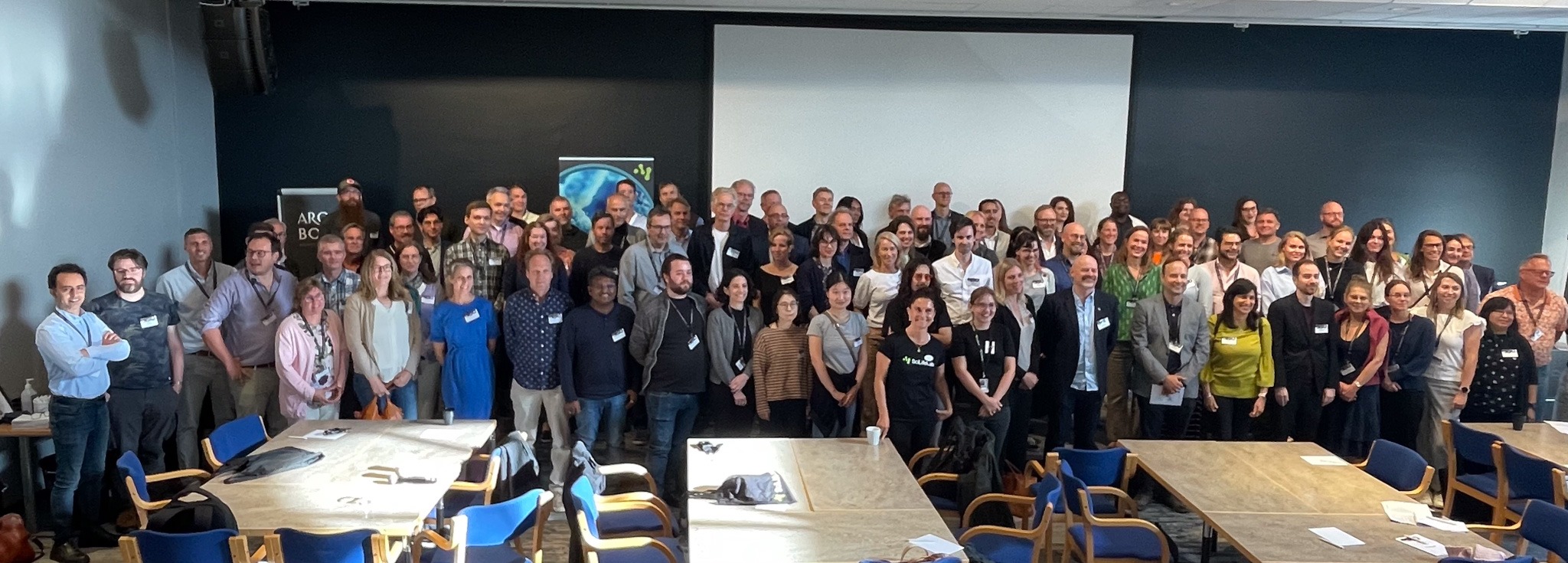SciLifeLab PLP Program gathered experts and stakeholders of pandemic preparedness
On August 31 and September 1, the Pandemic Laboratory Preparedness Program gathered over 100 researchers, clinicians and authority representatives for oral and poster presentations and networking around the research forefront and technological breakthroughs from the Pandemic Laboratory Preparedness network.
The program was developed by the scientific committee with Staffan Svärd, Scientific lead of SciLifeLab’s Pandemic Laboratory Preparedness Program, (UU), Jan Albert (KI), Magnus Lindh (GU), Paula Mölling (Region Örebro), Peter Nilsson (KTH), Daniel Sheward (KI), Anna Székely (SLU), Marianna Tampere (KI) and Mariel Perez Zabaleta (KTH). The plenary program included speakers from Australia, the UK, and Canada along with the Swedish PLP community, presenting depth and breadth of national and international projects and initiatives for pandemic laboratory preparedness.
This meeting is the first of its kind, where we come together to share knowledge and discuss the best practices for handling pandemics and mitigating risk. During the conversations, it became clear that effective communication and building trust are crucial for a coordinated and speedy response in future pandemics.
Sara Byfors from The Public Health Agency (Folkhälsomyndigheten) presented an overview of the status of the legislation and structure of laboratory preparedness after the COVID-19 pandemic and summarized outcomes of investigations conducted in the aftermath of the pandemic. The corona commission stated that there was an ‘unclear division of responsibility and financial support’, and the investigation into the organization of communicable disease work by the National Board of Health and Welfare stated that ‘the organizational status of county medical officers needs to be clarified’. Furthermore, the review of the communicable disease work in Sweden by the National Audit Office (Riksrevisionen) stated that the ‘system for testing and contact tracing works well in the normal situation but not in a pandemic’.
“The overall aim of the evaluations of testing and contact tracing is to suggest what should be changed to be better prepared for the next pandemic. In summary, we need to work together in peacetime, to be better when it comes to technical infrastructure and research know-how”, said Sara Byfors.
Marc-André Langlois, Executive Director of COVaRR-Net, Canada, gave a presentation on the Coronavirus Variants Rapid Response Network and its transition into a Canadian Academic Network for Pandemic Preparedness (COVaRR-Net), in essence, a sister network to the SciLifeLab Covid-19 network and data sharing.
CoVaRR-Net is a network of interdisciplinary researchers from institutions across the country created to assist in the Government of Canada’s overall strategy to address the potential threat of emerging SARS-CoV-2 variants. The mandate is to coordinate, facilitate, support, and accelerate rapid response research throughout Canada.
“When we set up the COVaRR-Net it was to advise the decision makers and work in collaboration with clinicians. Part of our mission was also communication, not only to scientists but also to the general public” said Marc-André Langlois.
During the afternoon, the focus was on panel discussions highlighting the importance of surveillance, maintaining engagement from community and researchers, and communication – to advise decision-makers and to inform the community, as well as the need for long-term stability in keeping a trained workforce and maintenance of structural and technological investments made during the pandemic. The discussion was followed by several brief presentations and posters from projects funded through the Pandemic Laboratory Preparedness Program (through a donation from the Knut and Alice Wallenberg Foundation and through the PLP program).
The second day of the meeting was kick-started with an online presentation from Professor Edward Holmes at University of Sydney who gave a talk titled Metagenomics at the human-animal interface where he took the audience back to the first signs of the outbreak of COVID-19.
“In late 2019, we noticed a significant clustering of early cases around the Hunan market, susceptible wildlife was present in the market in late 2019, and in January 2020, we confirmed by metagenomics that most positive environmental samples fell in locations where wildlife was sold. Even though the markets are now closed, the breeding areas are open, and it is key to remember that game or fur-farmed animals pose a risk: this is the interface – and that is why we get pandemics” said Edward Holmes
Upon being asked about his reflections on how to tackle future pandemics and ensure transparency in findings of zoonotic viruses, Edward Holmes was clear;
“What is important for the future is not to let politics overshadow science – as a species- we should all work together on this – without the blame game!”, he finished.
In the morning session, we had the privilege of hearing from esteemed experts like Francois Balloux from University College London, Lars-Magnus Andersson from Sahlgrenska University Hospital, and Matti Sällberg from Karolinska Institutet. They shared their invaluable experiences from the initial phases of the pandemic and provided insights into potential risk management strategies and approaches for addressing future pandemics.
The meeting’s environment, hosting over 100 experts in pandemic preparedness, spanning from lab bench scientists to clinical professionals and data management experts, fostered collaborative group discussions on best practice and the importance of a national research infrastructure during a pandemic; prevention versus cure; and how to work together towards preventing the next pandemic.
“The collective competence of this group is truly inspiring, and I am deeply grateful for the chance to both listen and learn. It’s also a tremendous opportunity to facilitate collaborative discussions, where participants can share insights and best practices on pandemic laboratory preparedness,” summarized Staffan Svärd, Scientific lead of SciLifeLab’s Pandemic Laboratory Preparedness Program.





